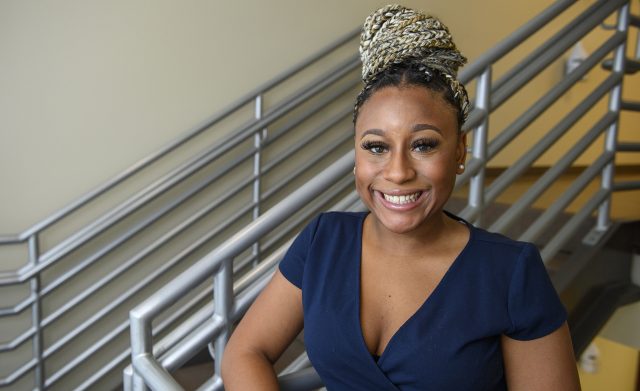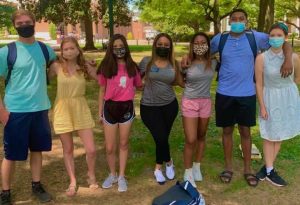
UM junior Jilkiah Bryant recently presented results of her research from Columbia University’s Summer Public Health Scholars Program at the 2021 CDC Undergraduate Public Health Scholars Program/Ferguson Student Showcase and Expo. Submitted photo
OXFORD, Miss. – Throughout Jilkiah Bryant’s youth in Macon, she spent her time trying to improve her community, a place of generational poverty and a food desert.
After working tirelessly in high school and college to improve the health and wellness of individuals in communities like hers, Bryant, a junior in the public health and health sciences program at the University of Mississippi, recently completed Columbia University’s prestigious Summer Public Health Scholars Program.
She recently presented her research from that program, which focuses on substance use among lesbian, gay, bisexual and transgender youth and investigates the relationship between family acceptance in adolescence and health status in young adulthood, at a national conference.
“Previous literature from the Family Acceptance Project (a research, intervention, education and policy initiative to prevent health and mental health risks for lesbian, gay, bisexual, transgender and queer-identified children and youth) has shown that families and caregivers have a major impact on their LGBT children’s risk and well-being,” Bryant said. “Higher rates of family rejection were found to be linked to worse health outcomes.
“LGBT young adults who experienced higher levels of family rejection during adolescence were 3.4 times more likely to use illegal drugs compared to peers from households where family rejection was absent or minimal. Since studies were first published surrounding homosexual youth, there has been documentation of serious health disparities among LGBT teens compared with their heterosexual counterparts.”
Bryant recommended prevention methods and public health intervention strategies such as drug addiction education, community-level coalitions targeted toward LGBT youth, community events to promote acceptance, school-based prevention programs for LGBTQ youth, family-based prevention programs for LGBT youth parents, and mass media campaigns.

Jilkiah Bryant (second from right) has fun with friends on a Freshman Ventures journey to Chicago with the Sally McDonnell Barksdale Honors College. Submitted photo
The summer scholars program is a rigorous curriculum that includes public health coursework at Columbia University; hands-on field experience and immersion in a diverse, economically disadvantaged urban environment; seminars and lectures with public health leaders; and mentoring by faculty members, ensuring students’ exposure to the breadth and importance of public health as a career option.
Her hands-on field experience was with Camba Inc., a Brooklyn-based nonprofit, where she worked on Project Accept LGBT Youth and the Brooklyn Youth Against Substance Misuse Coalition with the disciplinary focus on LGBT health.
“Due to an emphasis of LGBT youth and the effects of community and family rejection, I chose to focus on the rising health disparities among LGBT youth and related intervention efforts, particularly substance use,” she explained.
Bryant presented her research July 26-28 at the 2021 CDC Undergraduate Public Health Scholars Program/Ferguson Student Showcase and Expo: Public Health Workforce of the Future, which was conducted over Zoom.
She has served as an issue-based coordinator for the Office of Community Engagement, where she led and maintained relationships with community partnerships and worked closely with nonprofits in the Lafayette County area that work to improve health and well-being for vulnerable populations.
“Recently, I was promoted to undergraduate co-director of the Office of Community Engagement, where I will co-lead and direct a team of undergraduate and graduate students working to advance community-based learning and engagement among UM students, faculty and community organizations,” Bryant said. “In this capacity, I develop strong community partnerships that help promote civic engagement throughout our campus.”
Allison Ford-Wade, associate dean of community engagement and professor of public health in the School of Applied Sciences, met Bryant through the Office of Community Engagement.
“Jilkiah’s passion for the field of public health is evident through her desire to educate and work to improve health conditions,” Ford-Wade said.
“When we first met and talked, I knew she was a hard worker, wise beyond her years and overall a public health advocate that our state needs. Jilkiah’s desire to connect across campus, including volunteering and getting involved with community engagement efforts, is impressive and something other students should try to follow.”

Jilkiah Bryant (center) serves as a peer leader for students in the 2020 Luckyday Retreat on the Ole Miss campus. Submitted photo
Bryant considers being a Catalyzing Entrepreneurship and Economic Development, or CEED, scholar in the McLean Institute for Public Service and Community Engagement as a major accomplishment. In that role, she researches poverty alleviation through education and economic development in Mississippi and works within communities to promote entrepreneurship.
The scholars’ work includes engaging with high school students in communities to identify and improve compelling business ideas and to implement business plans through workshops.
“CEED scholars lead programs like the McLean Entrepreneurial Leadership Program, an annual Mississippi Entrepreneurship Forum and a campuswide virtual reality lab,” she said. “Every summer, CEED scholars are required to complete an internship.
“As a CEED scholar, I was recently able to assist develop and plan a bilingual health fair in Pontotoc on July 24 with the help of the McLean Institute and other partners such as MississippiCare and the UM School of Pharmacy.”
Bryant is a member of the Sally McDonnell Barksdale Honors College and a 2019 recipient of the McDonnell-Barksdale Honors Scholarship. She also is a Luckyday Scholar, where she served as a peer leader, and a consultant at the UM Speaking Center. She also was a member of the Increasing Minority Access to Graduate Education program.
For more information about the public health and health sciences program at UM, visit https://hesrm.olemiss.edu/ or call 662-915-8008.